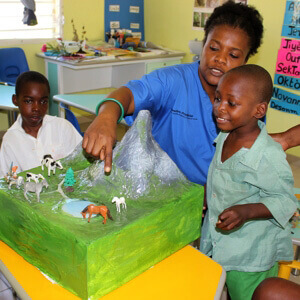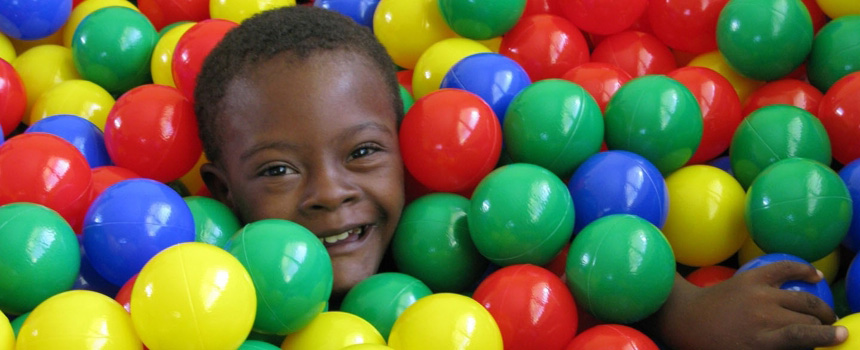 Opportunities for people with disabilities
Opportunities for people with disabilities
Developing ability through sports and exercise
"Where are you going with that thing?" When Christella rides a cab with her daughter, she often hears such hurtful sentences. The ‘thing’ is her daughter Julienne, who has been afflicted with a spastic paralysis since birth. In 2008, the first outpatient rehabilitation centre for people with disabilities was built in Haiti. This is still the only one of its kind there. Julienne is one of about 140 children who are treated and cared for there every week. And Christella? She stopped being one of those mothers who hide away their children at home out of shame, but one who sets a good example and contributes to a society without discrimination.
Necessity
Physiotherapy for children with disabilities in Haiti.
Activity
Physiotherapists provide various treatments to the 140 children at the rehabilitation centre Kay St. Germaine in Haiti once or twice per week.
Countable effort
Number of minutes of physiotherapy provided to children with disabilities at the rehabilitation centre.
Result
Jedes Kind wird in seinen individuellen Fähigkeiten durch die Behandlungen gestärkt. |The treatments strengthen every child according to its personal abilities.
Systemic effect
Children with disabilities will be better integrated into Haitian society and discrimination is reduced.
Background
Haiti is the poorest country on the American continent. The country is affected by tropical cyclones and political instability. There is hardly anyone who cares for people with disabilities. Gena Heraty of the rehabilitation centre says: "A mother usually has five or six children. If it turns out that one of them has health problems, the father often leaves the family. The financial support for Haitian families is difficult anyway due to the low employment opportunities. Often both parents have to do an odd job to keep the family afloat. Children with disabilities are often left ‘at home’ alone.” The prejudices which Haitian society has towards people with disabilities are predominantly religious or cultural. Children with disabilities are often seen as bewitched, people keep their distance from them and their fear quickly turns into aggression. Because of this social exclusion, children with a physical or mental disability do not have nearly the same opportunities as children without. The entire team of the rehabilitation centre has therefore been working for years towards the goal of improving the living conditions of people with disabilities in Haiti.
The good deed
The good deed aims at supporting the 140 children at the rehabilitation centre with physiotherapy. This includes relaxation and loosening exercises as well as support in learning movements. The physiotherapeutic treatments are one of many measures to promote the individual abilities of each child and to increase their long-term potential for social participation. The staff at the 'Kay St. Germaine' Centre for the Disabled support children with disabilities according to the philosophy that all people have equal rights and opportunities and should not be discriminated against due to their physical limitations. At the same time, they want to break down the prejudices people with disabilities face in Haiti.

AboutHaiti
Port-au-Prince
10 711 000
1.665
168
Haiti was the first Caribbean nation to declare independence. The country struggles to develop – mainly because of natural disasters such as earth quakes or tropical hurricanes.
About the organization and further information
nph Kinderhilfe Lateinamerika e.V.
Website
http://www.nph-kinderhilfe.org




